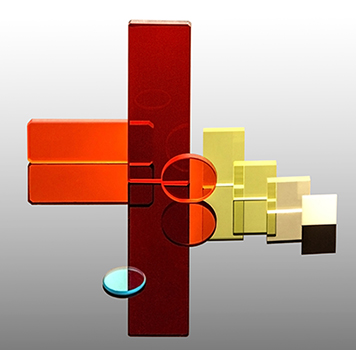p: (262) 548-1155
e: sales@advancedoptics.com
REQUEST A QUOTE
Woman Owned Small Business
Optical Filter Technical Information
» For sales and capabilities please visit our main optical filter page.
Optical filters are designed to pass (transmit) or block (through absorption or reflection) specific wavelengths of light in the UV-VIS-NIR spectra. Advanced Optics custom fabricates three main types of optical filters: colored glass filters that absorb specific wavelengths of light, dichroic filters which reflect specific wavelengths of light and neutral density filters that attenuate (reduce) all wavelengths of incident light equally. All of these filters allow light not absorbed or reflected to pass through.
How to Order Optical Filters
Because optical filters are a very specialized service, a shopping cart purchase is not available. To request a quote or order optical filters, please fill out our Request a Quote form or call us directly at (262) 548-1155.

Glossary of Optical Filters
Filter Type |
Operation |
Properties/Application |
| Absorptive | Absorbs unwanted wavelengths of light while transmitting others. | Useful in low power applications, less precise than other types of filters. |
| Dichroic | Reflects unwanted wavelengths of light while transmitting others. | Useful in florescence microscopy, and may be used as a hot mirror. Can be used together with long pass filters to selectively pass a very narrow wavelength band. |
| Neutral Density | Evenly reduces the intensity of transmitted wavelengths of light in a specific wavelength range. When used over the visible wavelength range does not affect color or hue. | Useful in photography or any application that requires the even reduction of light intensity such as attenuating a low power laser beam. |
| Long Pass | Pass longer wavelengths of light while rejecting shorter wavelengths, blocking is achieved by absorption (colored glass filters) or interference (dichroic filters). | Useful in spectroscopy, photometry and as emission filters, or whenever specific short/long wavelengths of light need to be separated. Can be used together with short pass filters to selectively pass a very narrow wavelength band. |
| Short Pass | Pass shorter wavelengths of light while rejecting longer wavelengths, blocking is achieved by absorption (colored glass filters) or reflection (dichroic filters). | Can be used together with long pass filters to selectively pass a very narrow wavelength band. |
| Hot Mirrors | Transmit visible wavelengths of light while reflecting IR wavelengths. | Protects objects from the buildup of unwanted heat, operation at 0 degrees is preferred. |
| Cold Mirrors | Transmit IR wavelengths of light while reflecting visible wavelengths. | Protects objects form the buildup of unwanted heat, operation at 45 degrees is preferred. |
Specifying the Correct Optical Filter
Optical filters are classified by their construction, which determines the way they filter light. There are many types of absorptive and reflective filters and careful selection should be based on the specific application in which they will be used. One should consider the following when selecting an optical filter for a specific application: wavelength range of interest as well as cut-on and cut-off properties, AOI of incoming light, energy of incoming light and operating environment.
Whether your application requires an absorptive filter, dichroic filter or neutral density filter, carefully considering your requirements is critical. Specific consideration should be given to the physical size, shape and tolerances of the substrate as tighter tolerances may require additional manufacturing which can add cost. The same applies to the surface quality of the filter which is expressed by a scratch and dig number. The lower the scratch and dig number, the more potential there is for a reduction in yield which drives up the cost of the filter.
Selecting the proper optical filter for your application is essential to saving manufacturing time, which translates to reduced costs. Advanced Optics can help you define your requirements.
